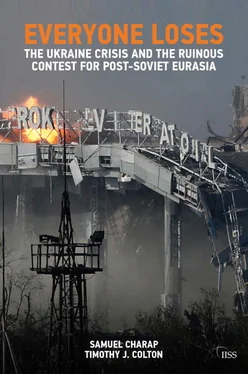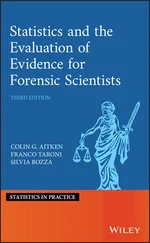A number of Western analysts have joined the EU’s trade negotiators in pronouncing the concerns Russia raised during the trilateral talks groundless, and concluding that therefore Moscow must have other, hidden motives. [74] As Dragneva and Wolzcuk write, ‘Its objections regarding the incompatibility of integration rules and processes seem spurious, and instead come across as an overt attempt to delineate its sphere of influence, in turn negating the sovereign right of Ukraine to leave this sphere and pursue economic integration with the EU.’ Dragneva and Wolczuk, Ukraine Between the EU and Russia , p. 117.
This explanation, while not necessarily inaccurate, relies on inference rather than evidence; the Russian negotiators could have been sincere but mistaken. The broader point is that the EU and Ukraine wanted to deepen their geo-economic integration without Russian involvement, and Moscow was not prepared to continue to extend preferential trade arrangements to Ukraine under these circumstances. While it seemed as if Ukraine’s president was prepared for a compromise on the DCFTA when he arrived at the Wales summit, the EU – for institutional-bureaucratic reasons – insisted the text could not be altered.
When the DCFTA went into effect on 1 January 2016, Russia suspended the CIS trade preferences accorded to Ukraine, effectively instituting a punitive tariff hike. Moscow also placed an embargo on Ukrainian agricultural imports similar to its countersanctions against the G7. In response, Kyiv banned a variety of Russian imports including meat, fish, vegetables, fruit, dairy and alcohol products. Taken together with tit-for-tat sanctions that cut direct air links between the countries (affecting up to 70,000 passengers per month), by 2016 Russian–Ukrainian economic ties had been almost completely severed. And the geo-economic stalemate was more intractable than ever.
CHAPTER FOUR
The negative-sum game and how to move past it
Everyone loses
The crux of our argument is that the Ukraine crisis is the apotheosis of a broader regional dynamic: zero-sum policies producing negative-sum results. It is a game that has produced no winners. All major players are worse off today than they were when the crisis began.
Ukraine, the central battleground, has been hit the hardest. It has lost control over the Crimean peninsula and over a population there of more than 2m. [1] Only time will tell if this loss is irreparable, but it is obvious that Russia under its current rulers, and quite likely under their successors, will be loath to give this territory back. It cannot be recovered by force of arms. It is doubtful if the population would cooperate in any reversal of status, barring a drastic change in circumstances.
Pro-Russian Crimeans might have rejoiced in their new-found freedom from the Ukrainian government; the euphoria was short-lived. The peninsula’s status as a subunit of Russia is internationally unrecognised, hotly contested by Western states and ergo reversible. The most draconian of the US and EU sanctions, and probably the most lasting, have been imposed on economic interaction with Crimea. They are as stringent as those once levied on Iran: not only are Western firms forbidden from investing or trading, but even Russian firms that conduct business in the US or EU are effectively barred from operating there. [2] For example, Sberbank, Russia’s omnipresent state-controlled savings bank, with offices in the West, has not operated branches in Crimea since the annexation for fear of running afoul of the sanctions. See ‘Sberbank nazval rabotu v Krymu nepozvolitel’noi dlya sebya’, Interfax, 29 May 2015, http://www.interfax.ru/business/444505 .
Budgetary injections from Moscow have been offset by rampant inflation caused by the Ukrainian blockade on exports to Crimea, the cutting off of irrigation water for agriculture, and blackouts following the severing of electrical lines on the Perekop isthmus joining the peninsula to the mainland. [3] In a telltale sign that not all Crimeans are thrilled with their new situation, a retiree berated Dmitry Medvedev, now prime minister of Russia, about her inadequate pension. With the cameras rolling, the most he could offer in response was, ‘There’s no money, but you hang in there!’
Along with these economic challenges, the OSCE reports that the ‘human rights and fundamental freedoms’ of Crimeans are being abridged. [4] Organization for Security and Co-operation in Europe, Office for Democratic Institutions and Human Rights and High Commissioner on National Minorities, ‘Report of the Human Rights Assessment Mission on Crimea (6–18 July 2015)’, 17 September 2015, http://www.osce.org/odihr/180596?download=true .
Amnesty International documents widespread abuses by the Russian authorities, including ‘a series of abductions and torture of their critics’ and an ‘unrelenting campaign of intimidation’ against independent media and groups speaking for the Crimean Tatars, the Muslim minority population that was deported by Stalin and spent more than 40 years in exile. [5] Amnesty International, ‘Ukraine: One Year On: Violations of the Rights to Freedom of Expression, Assembly and Association in Crimea’, 18 March 2015, https://www.amnesty.org/en/documents/EUR50/1129/2015/en/ .
The takeover of Crimea was bloodless, but the fighting in the Donbas, as noted in the Introduction, has claimed approximately 10,000 lives. Some 1.8m Ukrainians have been displaced internally, while nearly 1.1m have registered as refugees in Russia. [6] Data from International Organization for Migration (May 2016) and UN High Commissioner for Refugees (June 2016), respectively. See International Organization for Migration, ‘IOM Assistance to IDPs and Conflict-Affected Population in Ukraine’, 19 May 2016, http://www.iom.org.ua/sites/default/files/general_map_eng_05-2016.png ; UN High Commissioner for Refugees, ‘Ukraine: UNHCR Operational Update, 14 May–10 June 2016’, http://reliefweb.int/sites/reliefweb.int/files/resources/UNHCR%20Operational%20Update%20on%20the%20Ukraine%20Situation%20-%2014MAY-10JUN16.pdf .
This latter number significantly understates flight to Russia since by all accounts most Ukrainians who did so have not gone through the formal registration process, preferring simply to find work or shelter with relatives.
The humanitarian impact goes beyond the tragedies of death and displacement. The UN, the OSCE and human-rights groups have documented widespread violations in the conflict zone committed by the Russia-backed rebels and by the Ukrainian government and paramilitary forces. ‘Both the Ukrainian government authorities and Russia-backed separatists in eastern Ukraine’, report Amnesty International and Human Rights Watch, ‘have held civilians in prolonged, arbitrary detention, without any contact with the outside world…. Most of those detained suffered torture or other forms of ill-treatment.’ [7] Human Rights Watch and Amnesty International, ‘“You Don’t Exist”: Arbitrary Detentions, Forced Disappearances, and Torture in Eastern Ukraine’, 21 July 2016, https://www.hrw.org/report/2016/07/21/you-dont-exist/arbitrary-detentions-enforced-disappearances-and-torture-eastern .
The Office of the UN High Commissioner for Human Rights (OHCHR) has reported ‘a pattern of cases of [the Security Service of Ukraine] detaining and… torturing the female relatives of men suspected of membership or affiliation with… armed [separatist] groups’. [8] Office of the UN High Commissioner for Human Rights, ‘Report on the Human Rights Situation in Ukraine 16 November 2015 to 15 February 2016’, 3 March 2016, http://www.ohchr.org/Documents/Countries/UA/Ukraine_13th_HRMMU_Report_3March2016.pdf .
No less repugnantly, separatist forces have ‘imposed an arbitrary system of rules, established a network of places of deprivation of liberty where detainees are tortured and ill-treated, and cracked down on dissent’ in areas under their control. [9] Office of the UN High Commissioner for Human Rights, ‘Report on the Human Rights Situation in Ukraine 16 February to 15 May 2016’, 3 June 2016, http://www.ohchr.org/Documents/Countries/UA/Ukraine_14th_HRMMU_Report.pdf .
The term ‘Donetsk basement’ became synonymous in 2014 and 2015 with makeshift subterranean prisons and torture chambers, where those suspected of pro-Maidan sympathies or other heretical views were held incommunicado. [10] Semen Dobryi and Vladimir Dergachev, ‘Shla by lesom vasha DNR – valyu v Rossiyu’, Gazeta.ru , 16 October 2015, http://www.gazeta.ru/politics/2015/10/14_a_7820639.shtml .
Читать дальше











